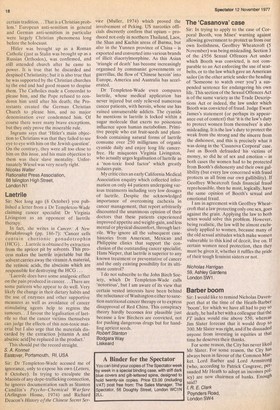The 'Casanova' case
Sir: In trying to apply to the case of Corporal Booth, von Mises' warning against allowing government to protect us from our own foolishness, Geoffrey Wheatcroft (5 November) was being misleading. Section 3 of the 1956 Sexual Offences Act under which Rooth was convicted, is not comparable to an Act enforcing the use of seatbelts, or to the law which gave an American sailor (in the other article under the heading of 'Someone to watch over you') a suspended sentence for endangering his own life. This section of the Sexual Offences Act is of the same variety as the Trade Descriptions Act or indeed, the law under which Booth was convicted of fraud. Judge Ewart James's statement (or perhaps its appearance out of context) that 'it is the law's duty to protect women from themselves' is also misleading. It is the law's duty to protect the weak from the strong and the sincere from the dishonest, and this is precisely what it was doing in the 'Casanova Corporal' case. Just as Booth defrauded his victims of money, so did he of sex and emotion — in both cases the women had to be protected from Booth's dishonesty and their own gullibility (but every law concerned with fraud protects us all from our own gullibility). If Geoffrey Wheatcroft finds financial fraud reprehensible, then he must, logically, have the same opinion of Booth's sexual and emotional fraud.
I am in agreement with Geoffrey Wheatcroft that a law protecting only one sex, goes against the grain. Applying the law to both sexes would solve this problem. However, being realistic, the law will be almost exclusively applied to women, because many of the old sexual attitudes which make women vulnerable to this kind of deceit, live on. If certain women need protection, then they must be given it, whether it ruffles the pride of their tough feminist sisters or not.
Nicholas Harrigan 59, Ashley Gardens London SW1,


































 Previous page
Previous page